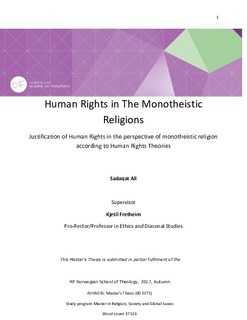| dc.description.abstract | The discourse of human rights has been very prominent in the post-world wars which led various international organizations and institutes to generate awareness on this subject and pave a path for implementation of fundamental human rights in the world. Many theories have been coined and proliferated in the world to look the matter more seriously. The question mark on the role of religion in this regard has led the discussion sidelining divinely revealed monotheistic religions. Thus, religions have been investigated and analyzed as very dormant in terms of their active role for ensuring basic human rights in the world. Particular study of religions in the light of modern human rights theories generated confusion about religions on human rights issues.
Present research aims to analyze and justify the nature of human rights in monotheistic religions in comparison with modern human rights theories. The research work engaged dissertation in two structural parts, first the study of human rights theories like, cultural, radical, universal, liberal, political and moral theories of human rights. Jack Donnelly’s theories of week and strong cultural relativism and universal radicalism have been especially highlighted.
The second part explores the nature of human rights in monotheistic religions I.e. Christianity, Judaism and Islam. The part concludes with the exploration and justification of human rights in monotheistic religions as discussed in modern human rights theories. The concepts of freedom of religions, privatization of religions, basic human rights as mentioned in UNHR charters and by modern theorists have been compared through religious texts. The thesis consists of major six chapters with a comprehensive conclusion of chapter seven. Chapter four deals with human rights and Christianity, chapter fifth elaborates the concept of human rights in Judaism and chapter sixth is based on the teachings of Islam in connection with Islam. The thesis concludes that all three monotheistic religions have been justified in terms of their role towards human rights in perspective of modern human rights theories with little disagreement on certain issues. The rights of neighbors, orphans, citizens, freedom of expression, religion etc are fully supported by each monotheistic religion. | nb_NO |
